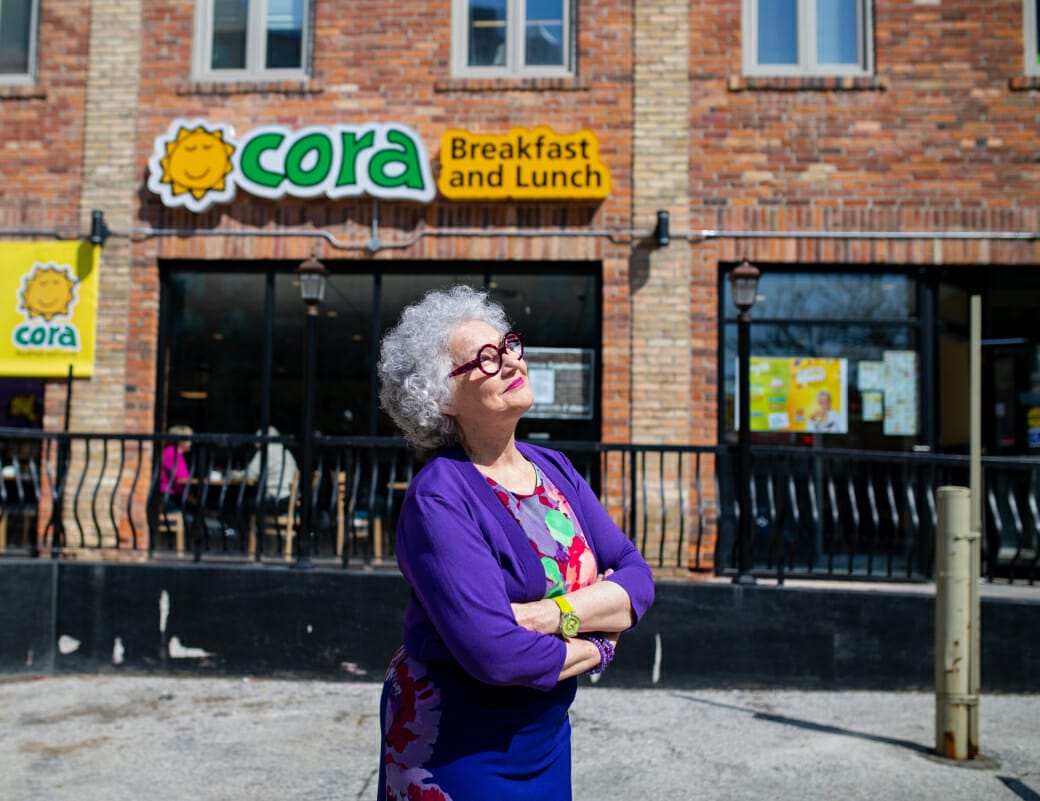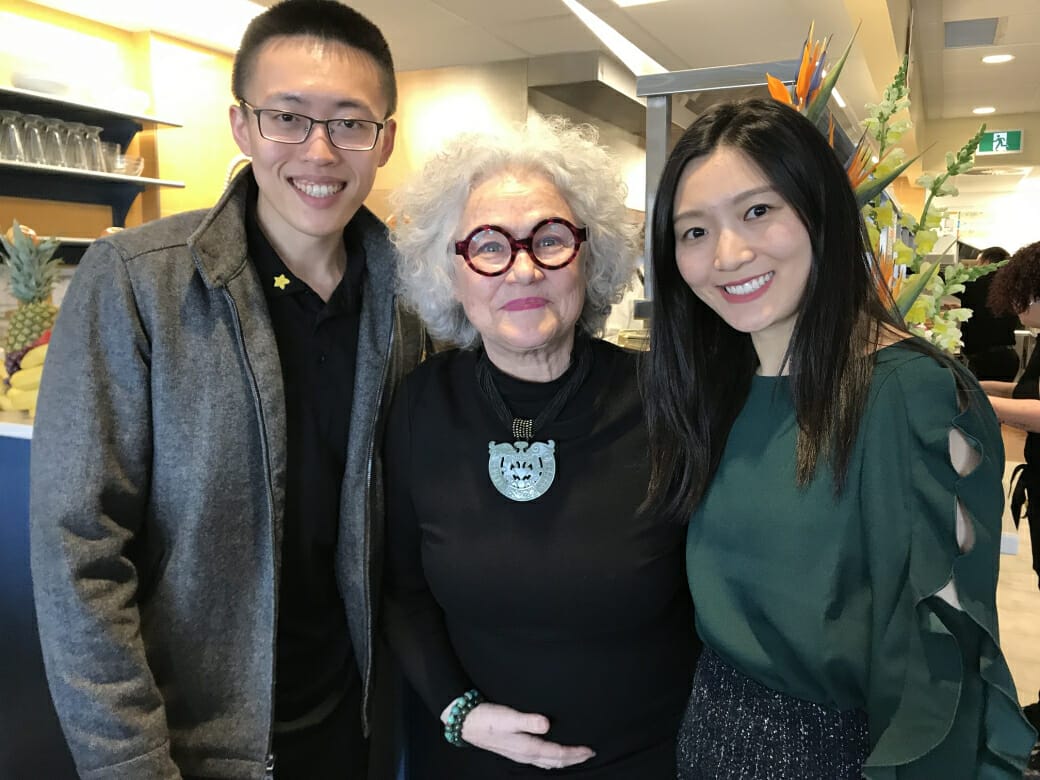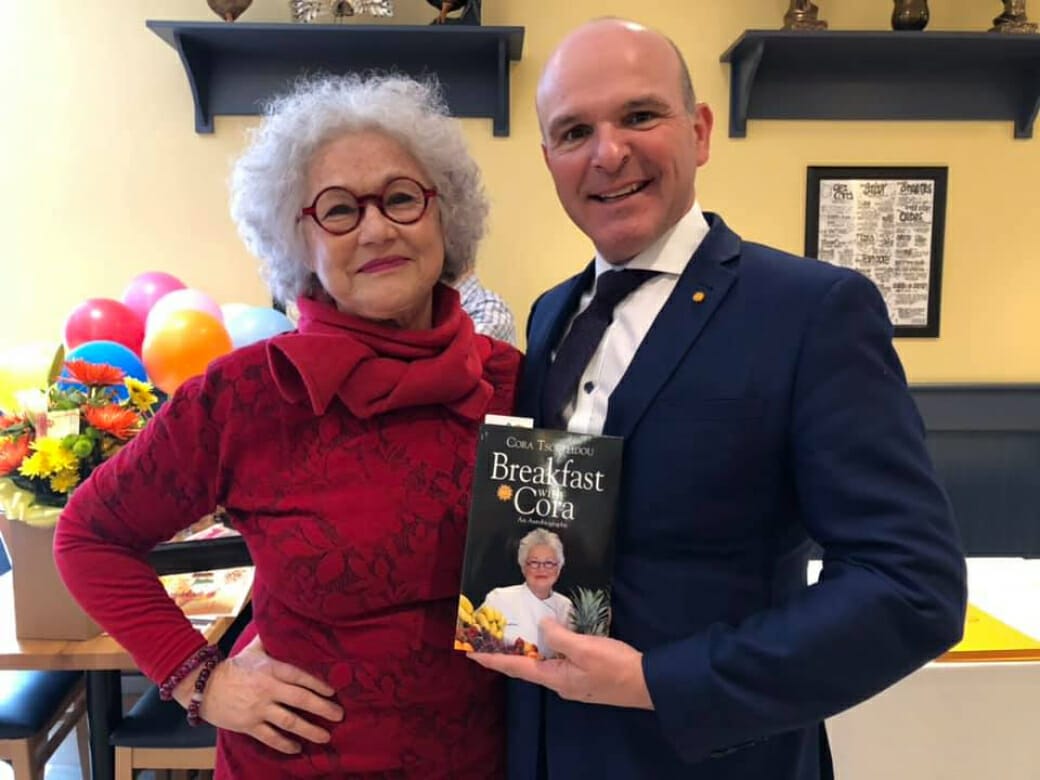Mme Cora's letter
See all letters

June 29, 2025
My love of books
In my big home, transformed into a library, there’s only a small corner left with room on a bookshelf for another book. All the walls are lined with bookcases, a collection of bestsellers I’ve been dusting for over 30 years. There’s a very long table in my four-season sunroom on which my most recent acquisitions are piling up. And the table is overflowing! I read incessantly, most times unable to separate the good from the bad.
I’m no expert when it comes to novels. On the other hand, when someone suggests a book by Dany Laferrière, I read the back cover and buy it regardless of the price, though it’s almost always second-hand. I know, I know! I’m a compulsive buyer when it comes to books. I’m totally unable to resist delicious poetry volumes that enrich my mind. Since I live in the country, my weekly trips revolve around second-hand bookstores, and there are so many in our beautiful Laurentians! Especially in the summertime when people everywhere hold yard sales and lay out their merchandise in the sun. I’ve often gotten my hands on incredible finds that were in good condition, some classics and even a few rarities whose pages had barely been touched.
I love books even more than I love ice cream or fudge! Of course, I sometimes fall for a gripping title before I even read the back cover. I seriously think my love of books is turning into an obsession. Really! I glance, I gaze, I get carried away. I grew up and then lived without affection, attention and, worse, even love. Am I compensating today by accumulating so many great books to keep me company? These piles of books certainly fill an existential void. Each one perhaps camouflaging the bars of an imaginary prison.
How can I free myself from this compulsive obsession to buy books, no matter how amazing they are? It’s my worst flaw, my vice: being a compulsive buyer who can’t stop herself from constantly buying new or used books I will probably never read, not even partially. There are some true book lovers who leaf through them with respect, keep a few of their favourite ones and display them like trophies on their shelves, a bit like me. And then there’s the real me, the maniac shopper who can’t resist buying new works that I most likely will never have time to read. Will my love of books die with me?
With tears in my eyes, I’ve already given away six large IKEA bags filled with my best cookbooks to municipal organizations. I was warmly thanked for it; maybe I should do the same for some of the classics and novels I’ve pretty much all read. How will I manage? I’ll never be able to sort through them all, and discarding them would break my heart. For all kinds of reasons, I love each one of my books – especially those that’ve taught me how to live, express myself and write properly.
All these pages that speak to me, the invented stories, the Sunday letters and a few published books. My life can be summed up as an accumulation of printed words, carefully preserved.
Cora
♥️

June 22, 2025
This life that's fading
What should I make of this strange theme occupying my mind today? I fold and unfold my hands; the cold entering my ten fingers. For the last few weeks, I’ve been trying to bring this keyboard to life, but all my beautiful words have remained silent.
My little self tumbles and falls into the void, most likely too soon. The long train of my breakfast queen dress crumbles like an overcooked cake. Despite the thousand crumbs of words, an abundance of Sunday letters and a feast for the birds, sometimes even in English, words now escape me.
What can I say, what can I do? Maybe one morning, or at dusk, my heavy head will empty itself like a dried-up well. I’m in pain and suffering. My world is a vast reservoir of words that scatter, spread out and, on the rare occasion, fly away. This incessant buzz of stories I have difficulty remembering. All the heavy sentences I need to rejuvenate; all the wonderful words I’ve started to forget.
I sometimes get the blues, these tiny nips of time. This awful feeling of being lonely, eaten away by depression or anguish. I’ve often written about happy things and real people, like those who wait for my letters each week. All I can do is stay close to my dear readers, to the presence of other humans, to my amazing peers.
I don’t want to get off the treadmill of life. Maybe I’ll stagger or even fall at times, but I’ll get back up no matter what. I’ll certainly experience loss, burn a batch of cookies, miss appointments and lose my keys. The important thing is to never forget the human in an encounter, an emotion or a simple curiosity. Could this be my way of escaping loneliness?
With my old superhero costume, will I resuscitate my forgotten memories, the free flow of words, the link between my ideas? Most of all, what can I do to slow down the growing absence of these precious words? Would a small comma suffice to change my life’s course?
The fog clears, morning is rising. A few vague dreams are still teasing my toes. So many words are falling into the void; so many sentences are fighting to be heard.
These aging days have opened an abyss of stupor, sluggishness and dismay. My body leans over my hands resting on the small sink, and the mirror reflects a once pretty face now inflicted with dark circles and wrinkles. I search for a nice word, a good idea. A grimace appears in the mirror.
A murder of crows fills my big apple tree, I stay warm in my retreat, peeling off the frocks of apples to make a dessert. What a talented cook I was, the creator of so many delicious breakfasts! I’m almost certain I’ll be feeding the angels and archangels in heaven.
The euphoria of possession fades quite quickly. Same goes for obstacles that are just a series of lessons to be learned. Could I have been a little too hard on myself? I always tried my best. I didn’t write to perform, but to express my love for my readers.
How can I survive when my reasons for living are shrinking? When work and family no longer need my effort, when my abilities are no longer solicited and I seem to be increasingly useless though I have so much time on my hands and a little energy still. How do you live without desperately hanging onto responsibilities that younger people or others do better? What meaning do you give a life that’s fading?
A few wise philosophers speak to me about a new life, a life with no other reason for living than life itself. No more temptation from desiring, hoping, achieving and pursuing success. I only want to be alive, able to read and hold a pencil to write or draw.
I promise myself I will change my modus operandi. I’ll soothe the old lady with a few lines of poetry, a few haikus, I’ll take up drawing again, go on road trips in my Mini, maybe even visit the Gaspésie again. Day after day, l’ll continue to observe and describe my small pleasures, my panics, my surprises and my little slips of memory.
Calm and willing, I wait until the day’s dying light illuminates the stars!
Cora
♥️
Read more

June 15, 2025
Letter to my father
For Father’s Day, I’m sharing this story with you: the time I resuscitated my Father’s memory to tell him I loved him.
Did I ever tell him? In my head, I see him in front of me, crossing the kitchen floor in Caplan. His large body, suddenly as light as a feather, moving like the ghost of a forgotten man. He almost never spoke to Mom. For her part, she ignored him most of the time. Their conversations were restricted to what was necessary. I remember the painful sorrow that haunted my sisters, my brother and I during those early years as well as the two adults we called Mom and Dad. What roles did they play in our lives besides working to feed us?
Often, at night, Dad opened a small can of sardines in just one pull. It would set mom off. I knew it all too well. She’d call him insatiable and remind him that he was already fat enough. “As large as the house,” she’d complain to Mrs. Berthelot, our neighbour. Dad grabbed the big red box of crackers in the pantry, opened the glass door of the cabinet and took the red plate that belonged to Granny Cora, his mother. I knew he always got a small craving at night, a voracious grief devouring his heart. It made me sad to see Mom insult him while he sat there eating in silence. Dad would take two headless, drained sardines with his fingers and lay them out on a cracker. Then, with his large hand, he’d drown his sorrow in his wide-open mouth. Then came the audible “crunch, crunch” of the sardines and crackers being dispatched in one go. Did I ever tell him I loved him?
For fun, the youngest one sometimes clambered on top of Dad when he was stretched out on the couch. Sitting astride his belly, she’d grab his shirt and kick her heels into his sides, his flesh already bruised by life. “Yee haw!” yelled my brother who tried to catch Dad’s swollen feet with a lasso. Inevitably, this game threw Mom into a fit of rage. She’d immediately order me to put an end to the nonsense, as Dad laid helpless on the couch. Did I ever tell him I loved him?
When night came, I sometimes heard Mom vent her hostility on Dad. I cried, my head under the pillow. I sobbed again when Dad left on Sunday afternoon or Monday morning with his travelling salesman’s suitcase. I had to wait five long days before he’d return home. Did I ever tell him I loved him?
The day before his departure, as Mom ironed Dad’s shirts and two pairs of pants, I’d hear her grumble about Dad’s size. She had to extend each leg twice on the ironing board, plus do the crotch, the pockets and the huge waistline of “her enormous husband,” as she often repeated. Infuriated, she’d apply a damp square of linen to help smooth the fabric. The day after he left for work, Mom would empty her bag of heartache in front of Mrs. Berthelot, who was married to a schoolteacher as skinny as a broomstick. When Dad left home to provide for us, did I ever tell him I loved him?
I knew nothing about love in those days. Do I really know any more now? As a child, I cried in secret when I saw Dad sad or hurt. Once married, I sobbed in silence when I had to face my overwhelming solitude. I was still very young and could tell that something wasn’t right between my parents. I observed our neighbours and noticed that, in our home, there was no affection between the parents. No kisses behind the ear that our neighbour gave his wife; no exchange of mischievous smiles or weekend trips to the cottage without the kids. Between our parents, the essential was absent. Even my brother had mentioned to Grandpa Frédéric that Dad brought sadness back with him every Friday night when he’d return from his travels.
One day, I must’ve been five or six, Dad came back from a trip and called me “Coco.” A small word that felt as soft as a kitten’s ears. The first time I heard him calling me Coco, my young heart shivered with happiness. As if the cat’s paw had found its way into the palm of my hand. For the entire week that followed, that short word reminded me of Dad’s face, his eyes lighting sparkles in mine. Did I ever tell him I loved him?
Then, one day, we left the orange cliffs of my childhood. But sorrow always moved with us, settling in at each subsequent home: in Mont-Joli, Sainte-Foy, in the suburbs of Montreal and, finally, in Sainte-Adèle. By that time, it was only the two of them. Dad passed away there, and the sorrow disappeared with him. In turn, I became an adult who also never knew the sweet nothings, tender looks and kisses enjoyed between husband and wife.
As I’ve written in a previous letter, I only learned about the reasons for their heavy grief at Mom’s funeral. Mom had been in love with a Protestant anglophone but was forced by the town priest and family to leave him. My grandfather convinced his broken-hearted daughter to marry a good man. A man who was crazy for her but who was never able to win her heart.
Sometimes, we sacrifice a whole life in the hopes of a few kisses or tender words whispered behind our ear. We imagine love as big as a mountain and, while we wait in vain, the mountain engulfs us. Big as it may be, it’s never enough to fill the void of love in our poor hearts.
I never really learned to say “I love you.” Those absent words, that unspoken, brief declaration full of meaning hung heavy on the sorrow I lived with since childhood. Today, an old woman, I decided to resuscitate my dad to tell him I loved him.
Yes, I love you, dearest Dad. You were my first love and you may just very well be my last, although I hope that won’t be true. If you can, send me an angel from above, Dad, one who will take human shape as a good, kind-hearted man, who’ll love as much as I loved you.
Your sweet Coco.
Happy Father’s Day to all dads!
💖
Read more

June 8, 2025
A big lobster and I
One morning, at the grocery store, miserable like a pumpkin who thinks it’s a vegetable, I walk down the aisles on the lookout for a little pick-me-up. Inside my sad heart, a few tears fall and blur my short grocery list. Aging and living alone unsettles me, zaps my appetite. I’m losing a bit of weight. Dressed in pants and a jacket a tad too roomy now, I walk down the frozen aisle like a polar-class icebreaker headed straight for its frozen sorrow.
In front of the candy display, I think about my two great-grandsons whose mother doesn’t want them eating hard candies. Personally, I have a sweet spot for the black-brown candy that tastes like coffee. So delicious! A young redhead approaches and places exactly 225 grams of sweets on the small candy scale.
— “Half a pound of happiness!,” says the young man. I wonder if it’ll be enough to satisfy his sweet tooth.
A heat wave suddenly clutches my insides. It’s noon on the dot, and, standing in this large grocery store, I’m hungry for hugs. I’m thirsty for love. I’d love to be in someone’s arms, in my mother’s or father’s arms, so they could rock me, reassure me and tell me tender words.
In the lettuce section, a handsome older man with a white apron strikes up a conversation with me and explains all the benefits of avocados. Avocado in French is spelled “avocat,” which sounds the same as the word for “lawyer.” So I reply with a smile: “The avocat (lawyer) I know is in very good health. He spends his days in the office drawing up important franchise and work contracts for the company.”
— “Excuse me, but the “avocat” I’m talking about is edible! Rich in lipids, it provides all kinds of healthy benefits.”
— “Well, I should eat more of them then, shouldn’t I?”
— “Take my word for it,” says the older man in the white apron. “I eat two or three every week, and I’m in tip-top shape. I play hockey, I jump rope and my wife forces me to maintain a big garden in the summer and shovel the snow in the winter.”
Heavens! I want to place this man wearing a white apron in my shopping cart. Instead, I feel the avocado. It turns out to be not too hard, nor too soft, and I eventually take two of them. The expert in the apron confirms they’re perfectly ripe and ready to eat. I suppose you can never have too much protection against diseases and other nasty things.
Then I make my way to the least interesting aisle to visit. On my right, soups, other canned goods and a thousand and one crackers. On my left, a mix of marinades, shrimp cocktail sauces and the new, made-in-Quebec real mayonnaise, MAG. I’m hungry! I’ll certainly need a few slices of ham and two or three well-washed lettuce leaves if I want to taste this delightful mayo between two slices of bread.
As I approach the fishmonger’s kingdom, I pretend to mentally count the number of lobsters I’ll need for my party of eight coming over on Saturday. The man, also handsome, takes a moment to think and comes around to the front of the display. He draws near to me and asks if any sides will be served with the lobsters. I weaken at the knees. I almost want to faint just so I can end up in his arms!
In front of me, a hundred perfectly cooked red lobsters are laid out on a bed of snow waiting to be taken home. Once again, I glance at the good-looking fellow who smells lightly of seaweed. He’s a bit younger than me and married. His handsome face is to die for.
Since we chat almost every time I come to do my grocery shopping, the fishmonger knows I’m from Gaspésie and, since lobster season is in full swing, he takes the liberty of touching my hand and chooses a very big one for me. Tonight, the big lobster and I will have a party.
Once at home, I take the hammer out of the toolbox. Just like Grandpa Frédéric taught me, I start by rinsing my tools in boiling water: the hammer to break the shell and the knife to carve out the insides. Then, I delicately open the big lobster’s belly. Wow, it’s full of meat! I pull and cut away the animal’s four pairs of legs, its two impressive front claws and the enormous muscular tail, ready to come off.
Suddenly I remember I’d also put a jar of the new mayo and two avocados in my cart. Perfect! I decide to treat myself to a real feast. I take a nice serving dish, a large soup bowl for the animal’s shell and my assortment of lobster crackers and forks from the cupboard. Then I uncork a good bottle of white wine and relish the moment.
My big red lobster swallowed my sorrow whole!
Cora
❤️
Read more









